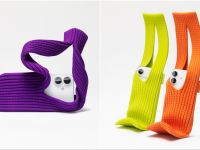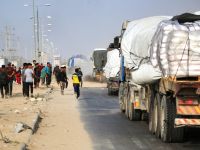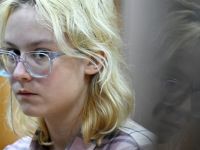Sanctions-hit Iraq hosted hundreds of companies from 45 countries on Wednesday at the opening of its annual Baghdad international trade fair, after many of the participants flew in despite a UN air embargo.
Organizers boasted a turnout of more than 1,500 firms, a record for the 10 years that Iraq has been under sanctions for its invasion of Kuwait.
An unprecedented tally of 14 ministers and senior officials from Arab countries took part in the opening ceremony of the 33rd edition of the fair, one of the organizers told AFP.
The fair, opened by Iraqi Vice President Taha Yassin Ramadan, saw eight countries make their debut: Armenia, Belgium, Brazil, Finland, Germany, Hungary, Romania and Venezuela.
Two Syrian ministers were among the last to fly in, raising to eight the flurry of flights into Baghdad since Tuesday, while Jordan's Prime Minister Ali Abu Ragheb was due later Wednesday.
Abu Ragheb is the first Arab head of government to visit Iraq since the 1991 Gulf War, further easing its isolation.
"This is all a large qualitative step for Iraq which has managed to break the embargo," said a western diplomat posted in Baghdad. "The large turnout and number of planes have turned Baghdad into an open capital, not one under siege."
Since Baghdad airport reopened in mid-August, more than 40 planes have landed carrying humanitarian aid as well as businessmen and politicians, in the face of a stony silence from Washington.
The United States had condemned the initial Russian and French flights that opened the floodgates.
In time for the fair, Russia sent 250 deputies, oil executives and other industrialists by plane, while more than 100 French companies are taking part in the 10-day exhibition.
British Foreign Office minister Peter Hain on Tuesday criticized the stream of solidarity flights, saying they benefited only President Saddam Hussein and not the Iraqi people.
"Those that are instituting commercial flights and other such measures have to ask themselves: 'Are they actually helping to end this conflict, or are they helping to perpetuate it by maintaining the present regime in power?'" said Hain.
The fair has this year been put under the banner of the Intifada, the uprising in the Palestinian territories, and there were several enormous posters of Al-Aqsa mosque and Palestinian "martyrs" killed in clashes with Israeli forces.
A giant portrait of Saddam, in military uniform, took center stage behind the main rostrum to be used for speeches.
Alongside was a painting of Saladin, a Kurdish warrior who commanded Egyptian and Syrian troops in the Muslim victory in the 1187 battle for Jerusalem and who hailed from Tikri, the same town as the Iraqi leader.
Foreign businessmen and investors will be jostling for position in the Iraqi market, lured by a country of 22 million people with the world's second largest oil reserves after Saudi Arabia.
Iraq has since late 1996 sold crude under UN supervision in a humanitarian program which authorizes the exports to finance imports of food, medicine and other essential goods including oil industry spare parts.
With world oil prices running high and a UN cap on export levels scrapped, the program has generated a windfall this year, although most of Iraq's contracts still have to be approved by a UN sanctions committee.
Grabbing the initiative, Iraq has stepped up efforts to erode the sanctions and it plans to resume internal flights on Sunday.
Baghdad has also decided to switch to the euro for its foreign trade transactions, including oil exports, after dumping the dollar as the currency of an enemy state.
Syria and Iraq, meanwhile, plan to reopen their oil pipeline later this month, in apparent defiance of the sanctions regime, the Middle East Economic Survey reported on Tuesday -- BAGHDAD (AFP)
© 2000 Al Bawaba (www.albawaba.com)









